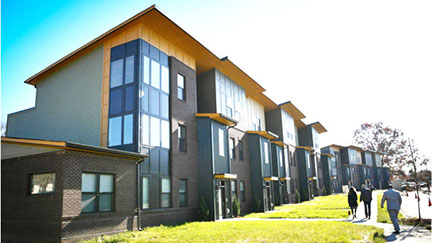By Stephen Elliott
NASHVILLE, TN — When early this month the Centers for Disease Control issued a moratorium on residential evictions through the end of the year in an effort to combat the spread of coronavirus, President Trump said he wanted “to make it unmistakably clear that I’m protecting people from evictions.”
In practice, it has been anything but “unmistakably clear.”
On Tuesday, dozens of Nashville tenants showed up to Davidson County General Sessions Court for detainer warrant hearings, at which landlords were seeking back rent or permission from the court to evict them. Dozens more did not show up, meaning the court in some cases granted the landlords a default judgment, with evictions possibly to follow in as soon as 10 days.
The landlord with the most cases on the docket: the Metropolitan Development and Housing Agency. And though MDHA leaders told the Post they have halted all evictions for nonpayment of rent through the end of the year, that was not evident to their tenants in court this week.
“It’s scary,” said Keneva Nesbitt, a resident at MDHA’s Vine Hill Apartments who was in court Tuesday fighting the eviction proceedings. “They’re there because they don’t have anywhere else to go. Where do you send them? It is not a good feeling.”
The CDC’s stated goal in halting evictions is to limit possible spread of COVID-19 when residents are put out of their homes and forced into more congregate living situations.
Nesbitt lost income over the summer because she was taking care of an ill son. She said her elderly next-door neighbor at Vine Hill was also in court on Tuesday because of a detainer warrant. Also present were young mothers, older people and other MDHA residents, all crowded into the courthouse, where social distancing is attempted but difficult with crowds of people.
“Today was docket call for warrants for possession, but no further action on the nonpayment warrants will be taken until 2021,” MDHA Communications Director Jamie Berry said Tuesday. “Every nonpayment allows for a pay-and-stay, so residents will have the rest of the year to bring their balances current or work out a long-term arrangement with their property manager. Earlier this month, MDHA executive director Jim Harbison made the decision not to evict for nonpayment in 2020. Accordingly, residents do not have to assert the CDC protection to stay through the end of the year. This includes residents who did not show up today, and they will also be allowed to stay through the end of the year.”
MDHA is still pushing forward with some evictions unrelated to nonpayment of rent, including one case in court Tuesday in which MDHA staff and Metro police alleged criminal activity in a unit. The CDC order applies only to evictions of those unable to pay rent.
Residents waiting in line outside the courtroom to meet with an MDHA attorney to discuss their cases were not aware of Harbison’s decision and were discussing ways to avoid eviction. District 5 Metro Councilmember Sean Parker, who was also in court Tuesday observing the proceedings, said he was pleased with the MDHA decision but urged better communication with residents unsure of their status.
“We know that crowded, indoor spaces are risky right now,” Parker said. “Tenants should have been notified of MDHA’s intent to push evictions to next year. They could have avoided being in a crowded courthouse for three or four hours.”
Court administrators and judges have sought to make the proceedings safe, including by staggering defendants into multiple groups to reduce the number of people in the courtroom at one time. Instead, many waited in the crowded hallway. A sign of the times: A bailiff in gloves held a bottle of disinfectant spray in his left hand on Tuesday as he raised his right hand to swear in a witness testifying before the court.
The confusion stems in part from the particulars of the CDC order. Unlike previous eviction protections under the federal CARES Act, the CDC moratorium applies to all residential properties, not just federally backed properties. But the new protection also requires tenants to assert the protection, while the earlier order put the onus on landlords to prove they were complying with the federal law.
Some landlords aren’t as lenient as MDHA, but tenant attorneys praise the addition of Bass Berry & Sims attorney Marc Tahiry as a temporary law clerk in the court. Tahiry is tasked, among other things, with informing defendants in eviction cases of their rights. At the start of court on Tuesday, Tahiry announced to the defendants in detainer warrant cases the details of the CDC order and asked if anyone wanted a copy of the CDC form required to assert the protections. Nearly half the hands in the room went up.
That’s no help to the tenants who don’t show up because they think the CDC order already applies to them, they’re wary of crowded courtrooms during the pandemic or for other reasons.
With landlords continuing to press for evictions despite the moratorium, housing attorneys are overwhelmed.
“We have more clients than we can serve,” said Julie Yriart, an attorney with the Tennessee Fair Housing Council. “We’re stretched to the brink.”
A new startup aimed at connecting gig workers to jobs helping evict tenants is even recruiting in the Nashville area, citing the state of the “dismal economy” as a boon for the new business.
And though MDHA and many other Nashville renters are protected for now from evictions for nonpayment of rent, they will have to pay up eventually. Davidson County judges are scheduling some detainer warrant hearings for the first week of January, after the CDC moratorium expires at the end of the year.
“The CDC moratorium is a Band-Aid,” Parker said. “It’s not a comprehensive approach. It will help some people stay housed for three more months, but then what?”


